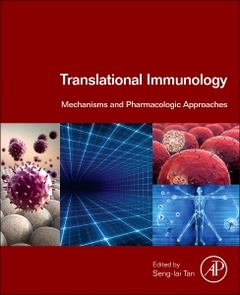Description
Translational Immunology
Mechanisms and Pharmacologic Approaches
Author: Tan Seng-Lai
Language: English
Subject for Translational Immunology:
Support: Print on demand
Description
/li>Contents
/li>Biography
/li>Comment
/li>
Translational Immunology: Mechanisms and Pharmacologic Approaches highlights and summarizes the most important advances in human immunology, clinical translations, new tools to analyze therapeutic targets, and new pharmacological approaches for autoimmunity, inflammatory disorders, and cancer. The book is an essential resource for those seeking to understand the potential translational applications of burgeoning studies in human immunology, helping readers make sense of the existing and emerging scientific advances. The book grounds fundamental science in the translational realm, providing insights from world renowned researchers at the top of their game in their respective fields, in both industry and academic settings.
Readers will gain an understanding of the rationale and mechanisms underlying current and emerging pharmacologic approaches for interventional immunology, the gaps therein, and new ideas for better and safer therapeutic approaches, and physicians will glean information about pharmacological limitations in altering disease progression and complications. This reference on the translational realization of the burgeoning findings in immunology provides a go-to reference for experienced professional clinicians, researchers, industry scientists, and those seeking more information on the field.
- Delivers comprehensive coverage of seminal human immunology discoveries and the resulting impact on therapeutic strategies
- Presents potential novel targets and approaches for clinical applications in organ specific and systemic autoimmunity, transplant rejection, cancer, and vaccine development
- Discusses lessons learned from successful and failed clinical trials with specific interventions, including pharmacological issues and limitations, and complications due to immunosuppression
- Provides information on new strategies and outstanding issues that should be addressed in future research
These books may interest you

Epigenetics of the Immune System 193.44 €



